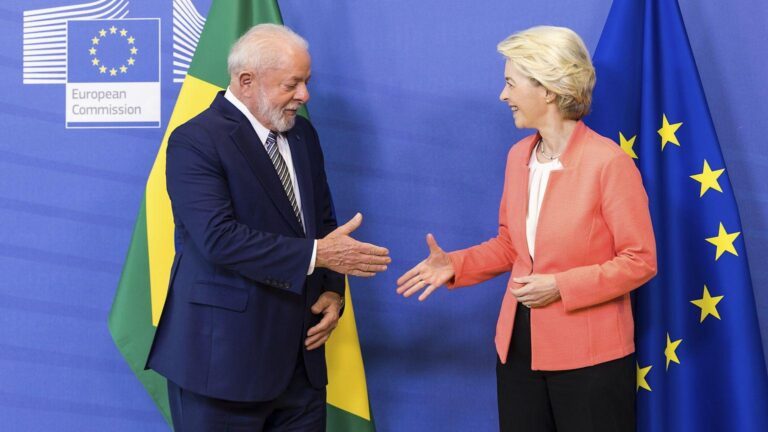Introduction:
In a growing pushback against the proposed Mercosur trade agreement, French Members of Parliament are intensifying their demands for a reassessment of the deal, citing concerns over environmental standards and agricultural practices. As negotiations between the European Union and the South American bloc achieve critical momentum, the French lawmakers’ stance underscores the complexities of balancing economic interests with national priorities. With strong sentiments echoing across political lines, this development is poised to influence not only France’s role in future trade negotiations but also the broader dynamics of EU-Mercosur relations.
French MPs Demand Protections for Local Agriculture in Mercosur Deal
In a decisive move, a group of French lawmakers is exerting pressure on the government to prioritize local agricultural protections in the ongoing negotiations surrounding the Mercosur trade deal. With growing concerns about potential foreign competition jeopardizing French farmers’ livelihoods, the MPs have highlighted specific areas where safeguards are necessary. They argue that without stringent measures, the agreement could allow for an influx of cheaper agricultural imports from South America, undermining domestic produce.
The MPs have presented their demands to the French Ministry of Agriculture, emphasizing the importance of maintaining not only economic stability but also the high quality and standards of French agricultural products. Key points raised include:
- Implementation of strong tariff barriers to protect local produce.
- Sustainability standards to ensure imported goods meet similar environmental regulations.
- Support measures for farmers transitioning to competitive markets.
| Concerns | Impacts |
|---|---|
| Increased imports from Mercosur | Price drops for local produce |
| Lax environmental standards | Damage to local ecosystems |
| Market saturation | Job losses in agriculture |
Concerns Over Environmental Standards Fuel Legislative Pressure
French legislators are increasingly vocal about their apprehensions regarding the potential environmental repercussions of the Mercosur trade agreement with South American nations. They argue that the deal could undermine France’s stringent environmental standards. The debate centers around the implications for local agriculture and deforestation in Brazil, where policymakers are concerned that competitive pricing from imported goods may encourage environmentally detrimental practices. Key stakeholders have raised alarms about greenhouse gas emissions and biodiversity loss, insisting that any trade agreements must align with France’s commitments to sustainability and climate action.
In response to these concerns, MPs are advocating for more robust provisions in the agreement to protect environmental integrity. They are pushing for clauses that enforce compliance with international environmental agreements and penalties for non-compliance. This has led to discussions surrounding possible amendments to the existing framework of the deal, emphasizing several critical demands including:
- Stricter regulations on deforestation
- Incentives for sustainable agricultural practices
- Transparency in agricultural imports and their environmental impact
As these discussions evolve, the future of the Mercosur agreement hangs in the balance, contingent upon France’s ability to balance economic interests with environmental responsibilities.
Calls for Transparency and Stakeholder Engagement in Trade Negotiations
In light of the ongoing discussions surrounding the Mercosur trade deal, there has been a significant call for greater transparency and enhanced stakeholder engagement from French parliamentarians. This push is driven by concerns over potential environmental impacts, labor standards, and the implications for local agriculture. Legislators argue that without proper engagement of affected communities and interest groups, the negotiations risk undermining public trust and acceptance of the deal. There is an increasing sentiment that these talks must not be conducted behind closed doors, but rather, involve a diverse array of stakeholders who can bring forward key insights and objections.
Among the demands being raised, French MPs have highlighted the need for a structured framework that facilitates open consultations with various sectors, including farmers, environmental organizations, and consumer advocates. They propose that this can be achieved through:
- Organized public forums and debates
- Regular updates from government negotiators
- Incorporation of feedback into negotiation strategies
This renewed emphasis on stakeholder involvement reflects a broader trend across Europe, where public scrutiny and accountability in trade negotiations are becoming imperatives for sustainable development and economic fairness. Failure to incorporate these elements may not only risk the legitimacy of the Mercosur agreement but also set a precedent for future trade deals, potentially alienating key constituencies across the continent.
Recommendations for Balancing Economic Benefits with Social Responsibility
As France navigates the complexities of the Mercosur deal, a framework must be established that effectively weighs economic advantages against social obligations. Stakeholders are encouraged to consider sustainable practices that foster economic growth while safeguarding human rights and environmental standards. Several strategies could be implemented:
- Enhancing Transparency: Ensure that trade agreements are publicly accessible and understandable to foster informed public debate.
- Stakeholder Engagement: Actively involve local communities, NGOs, and socioeconomic experts in the negotiation process to reflect diverse perspectives.
- Impact Assessments: Conduct thorough evaluations of the potential social and environmental impacts of trade deals before finalizing agreements.
Moreover, implementing rigorous regulatory frameworks can help balance these competing priorities. A potential model could involve the establishment of a dedicated oversight committee responsible for monitoring compliance with social responsibility standards throughout the trade process. This body could facilitate:
| Function | Objective |
|---|---|
| Monitoring | Assess compliance with environmental and labor standards |
| Reporting | Provide annual transparency reports to stakeholders |
| Advisory Role | Offer recommendations for ethical practices in trade |
Closing Remarks
In conclusion, the growing pressure from French MPs regarding the Mercosur trade deal underscores the complexities and conflicting priorities faced by policy-makers. As debates intensify around environmental standards, agricultural impacts, and international relations, the French government will need to navigate these concerns carefully. The outcome of this political push could significantly shape France’s future trade policies and its stance within the European Union. As the situation unfolds, stakeholders will be closely watching how this potential clash between economic interests and environmental commitments is resolved. For further developments, stay tuned to Euronews.




